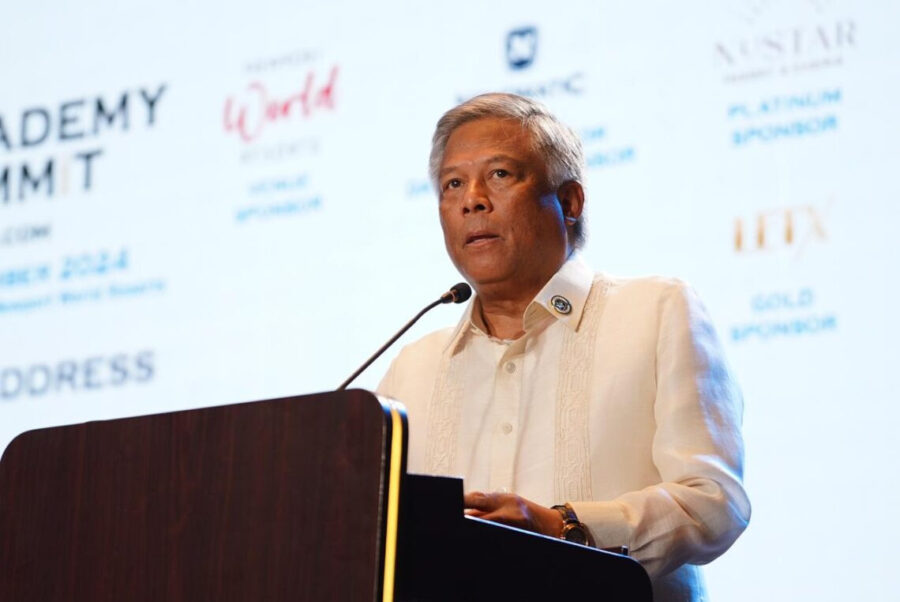PAGCOR adds PHP50 million to illegal gambling crackdown

Philippine gambling regulator PAGCOR will contribute PHP50 million (US$858,367)1 PHP = 0.0172 USD
2025-09-30Powered by CMG CurrenShift towards the National Bureau of Investigation’s efforts to eradicate illegal gambling, including identifiying banned Philippine offshore gaming operators.
The deal was formalized through a memorandum of agreement signed at PAGCOR’s office in Pasay City on Monday by PAGCOR Chairperson and Chief Executive Alejandro Tengco and National Bureau of Investigation Director Jaime Santiago.
Tengco said, “This morning, we are signing a memorandum of agreement that underscores the shared responsibility of PAGCOR and the NBI in promoting lawful, fair, and responsible gaming in the Philippines. This assistance will defray the cost of food and expenses for detainees from offshore operators, as well as support the Bureau’s legitimate operations against illegal gaming activities.”
PAGCOR turned over an initial payment of PHP25 million (US$429,184)1 PHP = 0.0172 USD
2025-09-30Powered by CMG CurrenShift to the National Bureau of Investigation on the day the agreement was signed.
Santiago added, “The NBI welcomes PAGCOR’s assistance, as it will enable us to step up our operations against illegal offshore operators and other unlawful gaming activities. This partnership affirms our shared duty to uphold the law and protect the Filipino people.”
This comes as PAGCOR recently experienced a 40% to 50% decline in income after the Bangko Sentral ng Pilipinas ordered the removal of gambling payment links by e-wallet providers.
Abi Bray brings strong researching skills to the forefront of all of her writing, whether it’s the newest slots, industry trends or the ever changing legislation across the U.S, Asia and Australia, she maintains a keen eye for detail and a passion for reporting.
Verticals:
Sectors:
Topics:
Dig Deeper
The Backstory
Why the enforcement push accelerated
Philippine regulators have moved from warning shots to an all-fronts crackdown on illegal online gambling, a shift driven by revenue leakage, consumer risk and political pressure to stamp out offshore operators. The Philippine Amusement and Gaming Corp., or PAGCOR, has cast regulated igaming as a pillar of the country’s fiscal base while blaming illicit sites for siphoning taxes and exposing minors to predatory content. In testimony to lawmakers, PAGCOR said regulated igaming generated PHP69 billion in the first half, with PHP27.5 billion flowing to public programs such as universal health care, yet warned the growth is threatened by unlicensed platforms that undercut safeguards and drain state coffers. The regulator detailed its case in a hearing recapped here: regulated igaming significant revenue driver in Philippines, PAGCOR says.
Financial regulators added urgency. The Bangko Sentral ng Pilipinas ordered e-wallet providers to strip payment links connected to gambling, a step that PAGCOR acknowledges has contributed to a steep drop in its recent income but also underscores the scale of unregulated traffic. PAGCOR cited a 40% to 50% hit to revenues following the delinking, a figure it has paired with new enforcement partnerships to deter illegal operators while preserving legal channels. The regulator’s message: allow legal play with strong guardrails or risk pushing Filipinos deeper into the black market.
Targeting offshore operators and their labor pipelines
The campaign’s sharpest edge is aimed at Philippine Offshore Gaming Operators, or POGOs, which have been outlawed under the government’s shifting policy stance. The administration has directed agencies to step up implementation of Executive Order No. 74, which bans offshore gambling firms and triggers deportations of undocumented workers tied to those outfits. In line with that directive, PAGCOR approved a PHP50 million grant to the Bureau of Immigration to repatriate foreign nationals detained at its warden facilities, addressing a bottleneck in deportations caused by workers unable to fund plane tickets. The agreement, signed with Immigration Commissioner Joel Anthony Viado, is detailed here: PAGCOR grants PHP50 million for deportation of illegal POGO workers.
The law-enforcement arm of the push is also getting fresh funding. PAGCOR committed another PHP50 million to the National Bureau of Investigation to chase illegal operators and manage detainee costs associated with raids. The memorandum of agreement, signed with NBI Director Jaime Santiago, includes an initial PHP25 million turnover and is designed to intensify surveillance and interdictions against offshore outfits and other illicit gambling networks. The details are here: PAGCOR adds PHP50 million to illegal gambling crackdown.
Taken together, the deportation funding and NBI grant create a quicker pipeline from raid to repatriation, aiming to raise the cost of operating underground while easing the detention burden on agencies that have struggled with capacity and humanitarian obligations. The couched rationale is dual: enforce the ban on offshore gambling and prevent legal channels from being tainted by association with labor abuses and crime.
Tech tools and a consumer shield
PAGCOR is pairing cash with code. The regulator is testing an AI-powered system that can flag about 60 illegal websites per minute, part of a broader bid to automate takedown referrals and prevent whack-a-mole enforcement fatigue. It has also previewed behavioral monitoring to spot risky play, fraud prevention measures and a 24/7 helpline for problem gamblers, signaling that consumer protection will be central to its sell to lawmakers and the public. The plan, and the pitch against calls for blanket bans, is outlined here: PAGCOR prepares to launch AI tool to identify illegal online gambling sites.
That posture extends to advertising and age controls. PAGCOR has pushed for stricter ad rules, coordination with the Ad Standards Council and AI-assisted age verification as it argues that tighter regulation beats prohibition. The regulator has said it collected around PHP50 billion from online operations in 2024 and wants a framework that filters out illegal foreign sites while letting licensed operators run under tougher standards. Its case against an outright ban is summarized here: PAGCOR calls for stricter online gambling rules.
To put a public-facing gate on the ecosystem, PAGCOR launched the PAGCOR Guarantee, a website that lists licensed operators and links to them, giving users a quick way to verify legitimacy. The site is meant to steer traffic to regulated platforms and away from scams, complementing AI sweeps and agency takedowns. More on that initiative: PAGCOR launches site to tackle illegal gaming.
Policy whiplash and the search for a stable footing
The policy environment remains fluid. The Senate passed the Anti-POGO Act of 2025 to reinforce the ban on offshore operators, while some lawmakers have floated sweeping prohibitions on online gambling altogether. The Department of Finance has proposed a dedicated online gambling tax to capture more revenue from the legal market, a nod to fiscal realities as authorities lean on sin taxes and digital levies to fund social spending.
PAGCOR is arguing for a middle course. It says technology and internet access are irreversible and that the best defense is a well-policed legal market with rapid takedowns, strict advertising limits, robust identity checks and interventions for at-risk play. The regulator has found allies across government in tightening payments, data-sharing and content controls, but must show that stronger rules can shrink the black market faster than bans that could push users into untraceable channels.
The delinking of e-wallets from gambling platforms by the central bank illustrates that tension. The measure dents short-term collections and user convenience but is intended to starve illegal operators of easy payments. PAGCOR has responded by funneling money into enforcement, deportations and consumer education, wagering that a cleaner ecosystem will ultimately be more durable and lucrative for the state.
What to watch next
The test now is execution. The NBI funding will be measured by arrests, case quality and the speed of coordinated raids with cybercrime and telecom regulators. The Bureau of Immigration grant will be judged by how quickly detainee backlogs fall and whether repatriations deter recruiters for offshore outfits. The AI detection system will have to demonstrate precision at scale, feeding timely referrals to the National Telecommunications Commission and content platforms without overblocking legitimate sites.
PAGCOR’s licensing portal will need constant updates to maintain trust, and its ad and age-verification rules must show teeth, especially against preinstalled or youth-targeted content that has drawn complaints. If lawmakers see tangible gains—more tax receipts from licensed play, fewer illegal sites accessible onshore, less aggressive marketing—they may favor regulation over prohibition. If not, momentum could swing toward harsher bans and broader payment restrictions, reshaping the digital gambling map.
Amid shifting laws and enforcement, the stakes are clear. PAGCOR is trying to preserve a revenue engine that funds classrooms and clinics while proving it can protect consumers and the country’s reputation. Whether the strategy sticks will depend on how well money, machines and mandates work together—and how quickly Filipinos can tell the difference between a legal platform and a criminal one.







